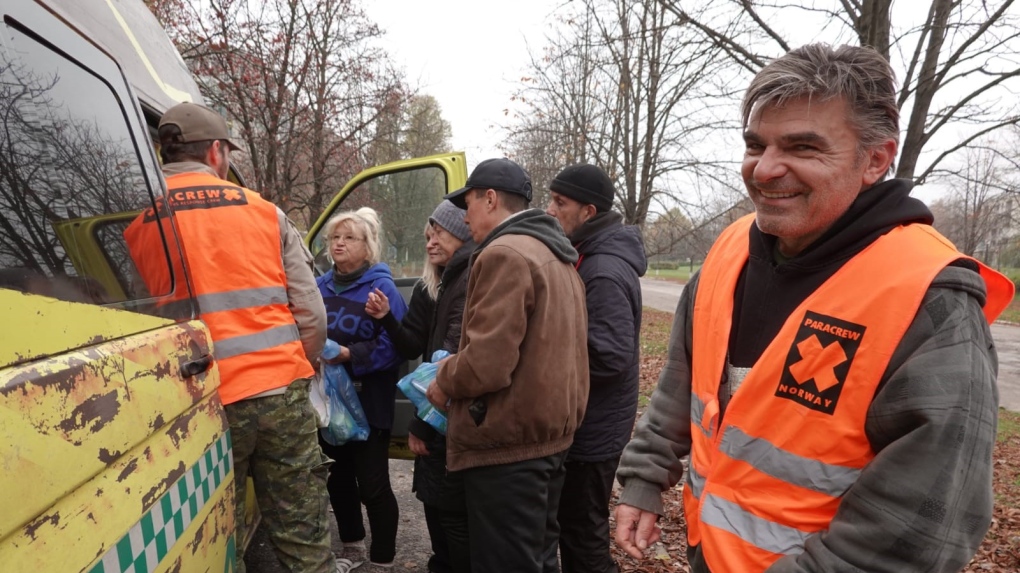
KYIV, UKRAINE – Incessant shelling and savagery have been on full display since the day Russia invaded Ukraine. Amid the immeasurable loss, incredible acts of humanity can be found rising above the devastation.
Tonko Ihnat arrived in Ukraine 11 months ago. While sitting at home watching the news, he saw the buildings being blown up and the lengthy lineups of Ukrainians trying to flee their own country and cross the border and save their children. It was then that he sold his truck and left behind his life as a handyman in Richmond Hill, Ont.
From serving food with the World Central Kitchen to delivering aid with multiple non-governmental organizations (NGO), the 58 year-old has, for now, devoted his life to helping the people of Ukraine.
“I felt I had to get over here and help in any way I could,” he said.
That individual support started off with helping people carry their bags across the Ukrainian border to Poland and then transitioned into a three-month project where he helped convert four schools into shelters.
The bulk of his time has been spent driving and delivering aid near the front lines with a Norwegian NGO called Paracrew. A devout Maple Leafs fan, at one point he found himself pulling out his phone to watch a Leafs game on the side of a road while artillery fire landed nearby. Reflecting on that experience, Ihnat said “it was a fun taste of home while far away from the life [he] once knew.”
Supporting himself in Ukraine with his own funds, he’s planning to stay as long as his savings will last. His hope is to stay until the war is over and then use his skills as a handyman to help rebuild a nation that he said he has grown extremely fond of over the past year.
While walking Kyiv’s Klitschko Bridge, which was bombed by Russian forces in October last year, Ihnat shares that he misses his family and sister back in Canada but added that “they’re only a phone call away.”
Genevieve Gosselin, a family doctor in Quebec, also travelled to Ukraine to deliver vital medical care on board a coal fired train in and out of Ukraine’s hot zones.
“When there are medical needs we go, obviously it’s never zero risk, that’s for sure,” she said at a dark train yard on the outskirts of Lviv, where she was heading to eastern Ukraine to shuttle injured civilians desperate to flee the front lines.
More than 90 of these trips have been completed and — with the help of Gosselin – the NGO Doctors Without Borders has transported more than 2,500 patients, both civilian and military, to larger, safer hospitals in Lviv and beyond.
It’s a two-day journey which takes place twice a week on average. Some of the people boarding the train have lost their homes and are trying to flee west, she said, while others are battling critical injuries incurred from the constant shelling taking place on the eastern front.
“It’s challenging because we also see a lot of young people who are wounded, “Gosselin added. “There’s also the elderly who are too poor to leave their villages, who arrive with nothing more than a piece of luggage to call their own.”
Gosselin, who has travelled across the world with Doctors Without Borders, tells us she plans on staying in Ukraine for two more months. With more medical deployments likely in her future, she says this is her way of helping.
Patricia Maruchak is another Canadian who left her family to help people in her native Ukraine.
At an office on the outskirts of Kyiv, she said that her husband and two sons remain at their home in Winnipeg while she runs Finn Church Aid’s office. The organization’s current focus is on helping repair and rebuild some of the 2,600 schools that have been damaged by missiles and shelling since the brutal conflict began.
“It’s unbelievable to see an entire school completely destroyed,” she says. “There’s also schools that have been near an explosion. All the windows are blown out, so we’ve been helping in situations like that, replacing windows, replacing doors, anything we can to help a school reopen,” she added.
In order to receive approval to open, each school in Ukraine must have a bomb shelter. Every time a siren sounds, the children must go into the bunker and wait until the all clear is given. Children can spend anywhere from 15 minutes to several hours in a shelter.
“What both teachers and students are going through right now is incredibly traumatizing,” says Maruchak.
It has also been difficult for the Maruchak to comprehend what is happening in a city she once called home, where a playground in Kyiv that she use to take her sons has been bombed by Russian forces.
Maruchak has committed to stay with Finn Church Aid in Ukraine for at least the next two years. She admits that she misses her family and her dog but said it is important work. “I’m well equipped to help here. I believe my skill sets are an asset,” she added.
When asked if they view their unselfish contributions in Ukraine as remarkable, each canadian spoke with shook their head. Ihnat shared a statement echoed by all three, “I’m nothing special. It’s the people of Ukraine who are remarkable.”
